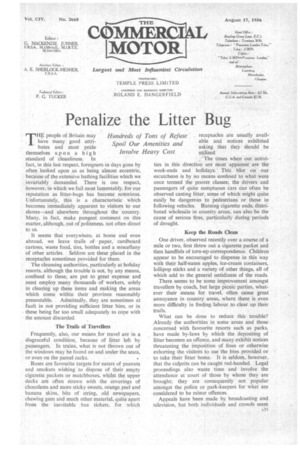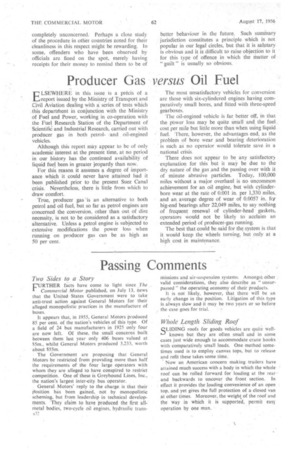Penalize the Litter Bug
Page 33

Page 34

If you've noticed an error in this article please click here to report it so we can fix it.
THE people of Britain may have many good attri butes and most pride themselves upon a high standard of cleanliness. In fact, in this last respect, foreigners in days gone by often looked upon us as being almost eccentric, because of the extensive bathing facilities which we invariably demanded. There is one respect, however, in which we fail most lamentably. for our reputation as litter-bugs has become notorious. Unfortunately, this is a characteristic which becomes immediately apparent to visitors to our shores—and elsewhere throughout the country. Many, in fact, make pungent comment on this matter, although, out of politeness, not often direct to us.
It seems that everywhere, at home and even abroad, we leave trails of 'paper, cardboard cartons, waste food, tins, bottles and a miscellany of other articles. Seldom are these placed in the receptacles sometimes provided for them.
The cleansing authorities, particularly at holiday resorts, although the trouble is not, by any means, confined to these, are put to great expense and must employ many thousands of workers, solely in clearing up these items and making the areas which come within their province reasonably presentable. Admittedly, they are sometimes at fault in not providing sufficient litter bins, or in these being far too small adequately to cope with the amount discarded.
The Trails of Travellers Frequently, also, our means for travel are in a disgraceful condition, because of litter left by passengers. In trains, what is not thrown out of the windows may be found on and under the seats, or even on the parcel racks. • Buses are favourite targets for eaters of peanuts and smokers wishing to dispose of their empty cigarette packets or matchboxes, whilst the upper decks are often strewn with the coverings of chocolates and more sticky sweets, orange peel and banana skins, bits of string, old newspapers, chewing gum and much other material, quite apart from the inevitable bus tickets, for which receptacles are usually available and notices exhibited asking that they should be utilized.
The times when our activities in this direction are most apparent are the week-ends and holidays. This blot on our escutcheon is by no means confined to what were once termed the poorer classes; the drivers and passengers of quite sumptuous cars can often be observed casting litter, some of which might quite easily be dangerous to pedestrians or those in following vehicles. Burning cigarette ends; distributed wholesale in country areas, can also be the cause of serious fires, particularly during periods of drought.
Keep the Roads Clean One driver, observed recently over a course of a mile or two, first threw out a cigarette packet and then handfuls of torn-up correspondence. Children appear to be encouraged to dispense in this way with their half-eaten apples, ice-cream containers, lollipop sticks and a variety of other things, all of which add to the general untidiness of the roads.
There seems to be some improvement amongst travellers by coach, but large picnic parties, whatever their means for travel, often cause great annoyance in country areas, where there is even more difficulty in finding labour to clear up their trails.
What can be done to reduce this trouble? Already the authorities in some areas and those concerned with favourite resorts such as parks, have made by-laws by which the depositing of litter becomes an offence, and many exhibit notices threatening the imposition of fines or otherwise exhorting the visitors to use the bins provided or to take their litter home. It is seldom, however, that the culprits can be caught red-handed_ Legal proceedings also waste time and involve the attendance at court of those by whom they are brought: they are consequently not popular amongst the police or park-keepers for what are considered to be minor offences.
Appeals have been made by broadcasting and television, but both individuals and crowds seem completely unconcerned. Perhaps a close study of the procedure in other countries noted for their cleanliness in this respect might be rewarding. In some, offenders who have been observed by officials are fined on the spot, merely having receipts for their money to remind them to be of better behaviour in the future. Such suminary jurisdiction constitutes a principle which is not popular in our legal circles, but that it is salutary is obvious and it is difficult to raise objection to it for this type of offence in which the 'hatter of " guilt " is usually so obvious.




































































































